#US Army in South Asia
Text
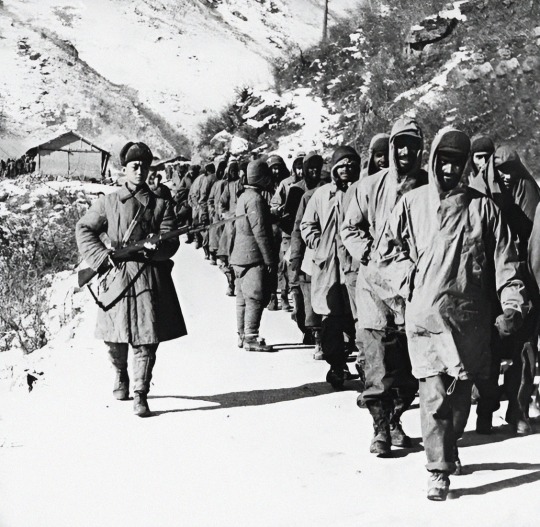
American soldiers captured by the Chinese People's Volunteer Army near the Chosin Reservoir. November 1950.
#korean war#cold war#war history#korea#prisoners of war#1950s#photography#korean#south korea#north korea#us troops#chinese army#asia#1950#us army#us marines#military history#tumbler#photo#history
75 notes
·
View notes
Text
A Scenario which I think will happen if President Bong Bong Marcos (PBBM) doesn't change his current Foreign Policy towards the South China Sea (SCS) is the Philippines will eventually lose Ayungin Shoal in 2024, and the Philippines could retaliate by trying to cut off Economic Ties with China which will result in Hardships especially for the ordinary Filipino on the Street
#president bong bong marcos pbbm#south china sea scs#philippines#china#united states us#armed forces of the philippines afp#department of national defense dnd#pinklawans#enhanced defense cooperation agreement edca#taiwan#ayungin shoal#free trade agreement fta#south east asia sea#sabah#malaysia#new peoples army npa
0 notes
Text
As China’s 'encirclement' of Taiwan continues, US warship sails through South China Sea
New Post has been published on https://www.timesofocean.com/as-chinas-encirclement-of-taiwan-continues-us-warship-sails-through-south-china-sea/
As China’s 'encirclement' of Taiwan continues, US warship sails through South China Sea
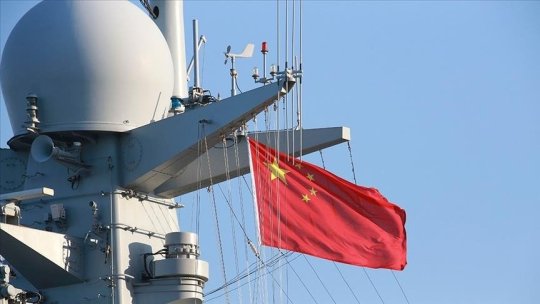
Istanbul (The Times Groupe) – Beijing conducted joint flights of jets and naval frigates on Monday after a US warship sailed through the disputed South China Sea.
People���s Liberation Army (PLA) said it “organized naval and air forces to track and monitor” the US Navy destroyer USS Milius that “illegally trespassed into waters near China’s Meiji Reef in Nansha Islands in the South China Sea on Monday.”
Earlier on Monday, the 7th Fleet of the US military in Asia-Pacific deployed its Arleigh Burke-class guided-missile destroyer USS Milius (DDG 69) in the South China Sea.
On April 10, the Arleigh Burke-class guided-missile destroyer USS Milius (DDG 69) asserted navigational rights and freedoms in the South China Sea near the Spratly Islands, consistent with international law.
Read more: https://t.co/BcOAXsufuO pic.twitter.com/PNyja70Vbv
— 7th Fleet (@US7thFleet) April 10, 2023
The fleet said it “asserted navigational rights and freedoms in the South China Sea near the Spratly Islands, consistent with international law.”
“ After completing the operation, USS Milius exited the excessive claim area and continued operations in the South China Sea.
Within 12 nautical miles of Mischief Reef, the United States conducted normal operations. Mischief Reef, which is submerged at high tide in its naturally formed state, is not entitled to a territorial sea under customary international law, according to the statement.
During the US warship’s voyage, China continued its three-day “military sword” exercises around Taiwan.
According to the Chinese daily Global Times, the PLA Navy Shandong aircraft carrier group was in waters east of Taiwan island where Chinese sorties, including those of J-15 carrier-borne fighter jets equipped with live missiles, took off and landed.
Taiwan’s Defense Ministry said its air defense units “remain on high alert for contingencies, steadfastly maintaining their posts 24/7, showing that we can and we will defend our skies.”
Taiwan detected 70 PLA aircraft and 11 PLA naval vessels around the island nation earlier today, 35 of which crossed the Taiwan Strait and entered Taiwan’s southwest and southeast air defense identification zones (ADIZ).
“And we will never give up our beliefs,” Taiwan’s Defense Ministry said on Twitter.
Neither the median line nor the ADIZ are recognized in Beijing.
In response to Taiwan’s President Tsai Ing-wen’s 10-day trip to Central America last week, US House Speaker Kevin McCarthy hosted Tsai Ing-wen for a meeting in California.
#Arleigh Burke-class guided-missile destroyer USS Milius (DDG 69)#asia pacific#Beijing#California#Chinese daily Global Times#disputed South China Sea#international law#Istanbul#jets#military exercises#military sword#Mischief Reef#naval frigates#People's Liberation Army (PLA)#south china sea#Taiwan#Taiwan's President Tsai Ing-wen#Taiwan’s Defense Ministry#United States#US House Speaker Kevin McCarthy#US Navy destroyer USS Milius#us warship#US warship's voyage#USS Milius#Politics
0 notes
Text

Monte Melqonyan/Մոնթե Մելքոնյան (1957-1993)
Honestly, I don't even know where to begin. He's one of those extraordinary individuals about whom countless books could be written and numerous movies could be made, yet still, so much would remain untold. You might wonder, "He's a National Armenian Hero—cool, but why should I know about him?" My answer is simple: if the world had more people like him, especially in today's times, it would be a much better place. He fought for justice, embodied culture and education, and radiated a deep love for his people and humanity as a whole. I believe everyone should aspire to have a little bit of Monte's spirit within them, regardless of their nationality.
Now, it's important to note that some things written about him in the Western press can be questionable and inaccurate. So, I would advise taking most of the information from those sources with a grain of salt.
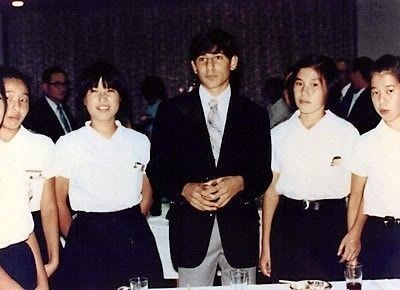
Monte was born on November 25, 1957, into an Armenian family in Visalia, California, that had survived the Armenian Genocide. From 1969 to 1970, his family traveled through Western Armenia, the birthplace of his ancestors. During this journey, Monte, at the age of twelve, began to realize his Armenian identity. While taking Spanish language courses in Spain, his teacher had posed him the question of where he was from. Dissatisfied with Melkonian's answer of "California", the teacher rephrased the question by asking "where did your ancestors come from?" His brother Markar Melqonyan remarked that "her image of us was not at all like our image of ourselves. She did not view us as the Americans we had always assumed we were." From this moment on, for days and months to come, Markar continues, "Monte pondered [their teacher Señorita] Blanca's question Where are you from?"
In high school, he excelled academically and struggled to find new challenges. Instead of graduating early, as suggested by his principal, Monte found an alternative - a study abroad program in East Asia. The decision to go to Japan was not random. He had been attending karate clubs and was the champion of the under-14 category in California. He also studied Japanese culture, including taking Japanese language courses. After completing his studies at a school in Osaka, Japan, he went to South Korea, where he studied under a Buddhist monk. He later traveled to Vietnam, witnessing the war and taking numerous photographs of the conflict. Upon returning to America, he had become proficient in Japanese and karate.
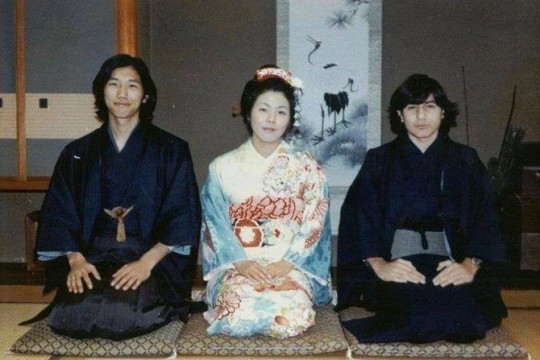
Having graduated from high school, Monte entered the University of California, Berkeley, with a Regents Scholarship, majoring in ancient Asian history and archaeology. In 1978, he helped organize an exhibition of Armenian cultural artifacts at one of the university's libraries. A section of the exhibit dealing with the Armenian Genocide was removed by university authorities at the request of the Turkish consul general in San Francisco, but it was eventually reinstalled following a campus protest movement. Monte completed his undergraduate work in under three years. During his time at the university, he founded the "Armenian Students' Union" and organized an exhibition dedicated to the Armenian Genocide in the late 19th and early 20th centuries in the Ottoman Empire and the Republic of Turkey.
Upon graduating, he was accepted into the archaeology graduate program at the University of Oxford. However, Monte chose to forgo this opportunity and instead began his lifelong struggle for the Armenian Cause.

In the fall of 1978, Monte went to Iran and participated in demonstrations against the Shah. Later that year, he traveled to Lebanon, where the civil war was at its peak. In Beirut, he participated in the defense of the Armenian community. Here, he learned Arabic and, by the age of 22, was fluent in Armenian, English, French, Spanish, Italian, Turkish, Persian, Japanese, and Kurdish.
From 1980, Monte joined the Armenian Secret Army for the Liberation of Armenia (ASALA – I promise to tell you more about them later) and quickly became one of its leaders. In 1981, he participated in the planning of the famous Van operation. In 1981, he was arrested at Orly Airport in France for carrying a false passport and a pistol. During his trial, Monte declared, "All Armenians carry false passports—French, American—they will remain false as long as they are not Armenian." Over the following years, he perfected his military skills at an ASALA training camp, eventually becoming one of the group's principal instructors.
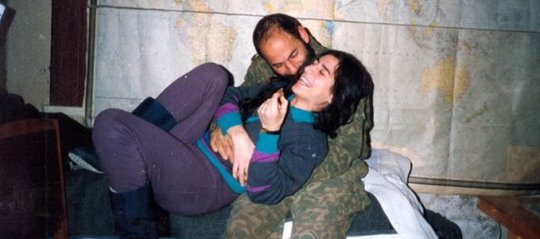
Monte with his wife Seda
After being released from a French prison (once again) in 1989, Monte arrived in Armenia in 1991, where armed clashes between Armenians and azerbaijanis had already begun. He founded the "Patriots" unit and spent seven months in Yerevan working at the Academy of Sciences, writing and publishing the book "Armenia and its Neighbors." In September of the same year, he went to the Republic of Artsakh to fight for his fatherland and its people. Due to his military expertise, he was appointed Chief of Staff of the Martuni defense district in 1992. His sincerity and purity quickly won the love and respect of the local population and the Armenian community as a whole.
Throughout his conscious life, Monte fought for the rights of Armenians, recognition of the Armenian Genocide, and the reclamation of Armenian homeland.
There are various versions of Monte Melqonyan's death circulating in both Armenian and azerbaijani media. According to official Armenian information, Monte was killed on June 12, 1993, by fire from an azerbaijani armored vehicle.
Monte remains a lasting testament to the incredible potential unleashed when the Armenian patriotic heart unites with sharp intellect.
youtube
In case you'd like to put a voice to the face and hear about the Artsakh struggle directly from Monte, here he is speaking about it in English.
#so many things have been left out#but I guess this is a good starting point#I promise to tell you more about ASALA and Van Operation in near future#monte melqonyan#armenia#armenian history#armenian culture#world history#artsakh#artsakh is armenia#translated literature#մոնթե մելքոնյան
221 notes
·
View notes
Text
Humanoid monster
Previous, Next

“What was that about?” Soap asks Gaz. The two of them backed down when the reporters got nosy, they followed her all night long hounding her for answers.
“Abraham believed In a theory, it's written in Latin so either she knows Latin or Abraham told her.” Gaz grumble digging through his notebook.
“What theory?”
“There was a time were humans and monsters got along, they worshiped this female deity. She was murdered, and war broke out, Abraham was born in the last few days of her reign.” Gaz explains finding his notes he had written about back when he was in school.
“So?”
“So Abraham no longer speaks about this time, and in one of his papers, he theorizes this deity is still alive.”
“Mate—”
“That woman is highly educated, she shouldn't be, she wasn't born here she *came* here. Teaching humans is banned in all states except for Switzerland, how does she know?” Gaz asks Soap shrug, it didn't sound important to him but from the look on Gaz’s face said it all.
“Mr. Garrick,” the two sergeants froze and turned to see Priscilla standing there peeping her head in head feather raising in slight embarrassment. “Do we need to cancel flight training?”
“No!” Gaz shouts and walks closer to her. “Your mother.”
“yes?”
“Did she go to school?” asked a question with a smile.
“No… Why?”
“Well your mother knows things she shoulders like a diety—“
“Oh you mean Abraham’s fairytales? he likes to tell fairytales when we were little, you know? of a better time where we’re all equal, it helped most of us sleep.” Priscilla says fondly with a sweet smile on her lips.
Gaz sighs and Soap pats him on the shoulder, with a small reassuring look and smile, “See mate, you overthinking it.”
“Your mother where did she come from?”
“She came from South America and found most of us traveling up to North America and sailing over to Asia, then traveling to Switzerland.” Gaz nods and the two walk to the field with the little Harpies.
The press saw them, and the monster swarmed them, “What’s your view of the orphanage director?” The first reporter asks.
“She’s my mother—"
“So she cut off your wings?”
“No! She found me like this—“
“If given the opportunity would you go home?”
“This is my home!” Priscilla shouts her frustration begins to teetering on tears. Gaz spread his wings out blocking her from the cameras.
“Don’t bother the kid—“
“As a soldier in the monster military aviator wing, what’s your view of this almost dystopian utopia?” One Gargon asks her snakes hissing with delight and anticipation.
“I am weary but everything here so far looks good, and the orphanage director didn’t know we were coming or how long we are staying,” Gaz said in the most PR statement possible. Switzerland has one of the biggest armies, and it is wise not to attack its citizens and their politics. The media followed them, Priscilla couldn't stop looking over her shoulder, they were making her uncomfortable.
“What's your relationship with each other?” a reporter asks.
“I'm helping the younger harpies fly.”
The reporters mostly watched, occasionally they would speak to their camera, and it was easy to hear them.
“Most of these harpies are missing wings or mutilated. We suspect that the orphanage—”
“Shut up, pendejo!” One of the kids shouts at the reporters. “We all had these injuries before the orphanage.”
“It’s done by you monsters,” another girl snaps.
“Why do you defend this place?”
“It’s our home,” nearly everyone replies.
—-
The air of attrition on cordiality was fading, for every child was a surveillance camera all going back to Mother Maia. This was not lost on anyone, not the soldiers or the reporters.
The children slowly became guarded. Weary and secretive. It wasn’t lost on the task force that they were no longer welcomed there. The gargoyle creatures that usually only watch began to show themselves more often, the dragons were more active, and they were expanding their territory.
Both sides of the war were left with little progress made, and far more interest in the orphanages. The human side is more than the monster’s.
“Maia,” Abraham walks into the dimly lit office. She looks up, and the veil hangs up on her hat hook. Abraham nodded and sat down. “My old contacts have warned me that the monsters have decided to hack—”
“I understand” Mother Maia responded in a calm tone, “I’ll change a few things. The only thing they will get is the spending log, it’s best.” She smiles and begins to type away.
“There have been talk about monsters adopting—”
“I will not allow it,” Mother Maia looks up, “we both know the children who will be adopted will be sent into the military or worse eaten, I am no fool and neither than you.” Abraham smiles and nods before standing up, his wings doing a small stretch.
“I am glad we are on the same page,” Abraham said with a smile, Mother Maia only nodded and continued to work.
Abraham always knew humans were not equal to monsters in strength, but their intelligence is quite admirable. It’s been centuries since Abraham found a human he could view as equal, but another Maia was that human.
She was articulate and wise for someone who never had a true education. And yet with his simple guidance, she was able to keep her children.
“What about the new disease?” Abraham froze and sighed. Everyone knew at this point, even the humans.
“The Monster scientists have named it Cerebrum deterioration, or as the soldiers call it brain rot.” Abraham studied Mother Maia’s face, most humans couldn't hide their glee when disguising this topic, all except for Mother Maia.
“How pitiful, has it linked to the human resistance?” she sighs the scars across her face rippling with the slight movement of her face.
“No, the scientists said it was discovered rather than made.” Mother Maia nods and continues to write.
“Let's keep informed if a war breaks out this could affect this free state.” Mother Maia said sternly. Abraham agreed. “And when the vaccine is made, be sure to be one of the first to get it, you are a model.” Abraham laughs but nods.
“You are a strange one—”
“I am only being realistic Abraham, even though you've been a pacifist for a few hundred years, you still hold power.”
“Of course.”
#call of duty#cod#cod mw2#modern warfare 2#simon ghost riley#141#john soap mactavish#captain price#kyle gaz garrick#monster au#monster 141 au#cod fic
68 notes
·
View notes
Note
Books you would recommend on this topic? Colonial, post colonial, and Cold War Asia are topics that really interest me. (Essentially all of the 1900s)
Hello! An entire century is huge and I don't quite know what exactly you're looking for, but here we are, with a few books I like. I've tried organising them, but so many of these things bleed into each other so it's a bit of a jumble
Cold War
1971 by Srinath Raghavan: about the Bangladesh Liberation War within the context of the Cold War, US-Soviet rivalry, and the US-China axis in South Asia
Cold War in South Asia by Paul McGarr: largely focuses on India and Pakistan, and how the Cold War aggravated this rivalry; also how the existing tension added to the Cold War; also the transition from British dominance to US-Soviet contest
Kennedy, Johnson, and the Nonaligned World by Robert B. Rakove: on the US' ties with the Nonaligned countries during decolonisation and in the early years of the Cold War; how US policy dealt with containment, other strategic choices etc
South Asia's Cold War by Rajesh Basrur: specifically about nuclear buildup, armament and the Indo-Pak rivalry within the larger context of the Cold War, arms race, and disarmament movements
Colonialism
India's War by Srinath Raghavan: about India's involvement in World War II and generally what the war meant for South Asia politically, economically and in terms of defense strategies
The Coolie's Great War by Radhika Singha: about coolie labour (non-combatant forces) in the first World War that was transported from India to battlefronts in Europe, Asia and Africa
Unruly Waters by Sunil Amrith: an environmental history of South Asia through British colonial attempts of organising the flow of rivers and the region's coastlines
Underground Revolutionaries by Tim Harper: about revolutionary freedom fighters in Asia and how they met, encountered and borrowed from each other
Imperial Connections by Thomas R. Metcalf: about how the British Empire in the Indian Ocean was mapped out and governed from the Indian peninsula
Decolonisation/Postcolonial Asia
Army and Nation by Steven Wilkinson: a comparative look at civilian-army relations in post-Independence India and Pakistan; it tries to excavate why Pakistan went the way it did with an overwhelmingly powerful Army and a coup-prone democracy while India didn't, even though they inherited basically the same military structure
Muslim Zion by Faisal Devji: a history of the idea of Pakistan and its bearing on the nation-building project in the country
The South Asian Century by Joya Chatterji: it's a huge book on 20th century South Asia; looks at how the subcontinental landmass became three/four separate countries, and what means for history and culture and the people on the landmass
India Against Itself by Sanjib Baruah: about insurgency and statebuilding in Assam and the erstwhile NEFA in India's Northeast. Also see his In the Name of the Nation.
I hope this helps!
49 notes
·
View notes
Text
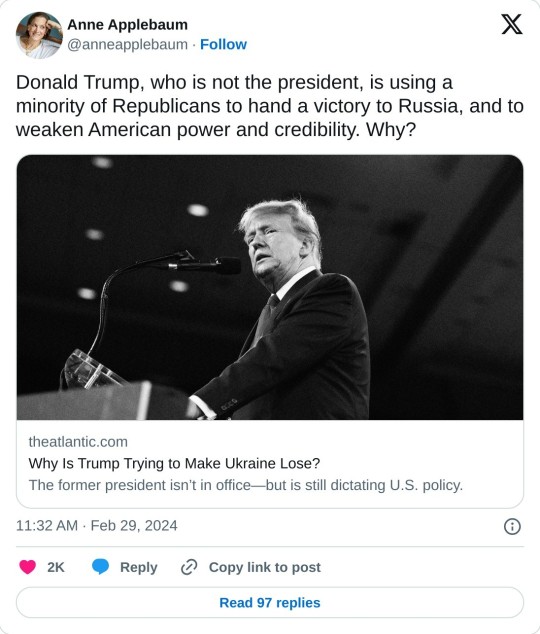
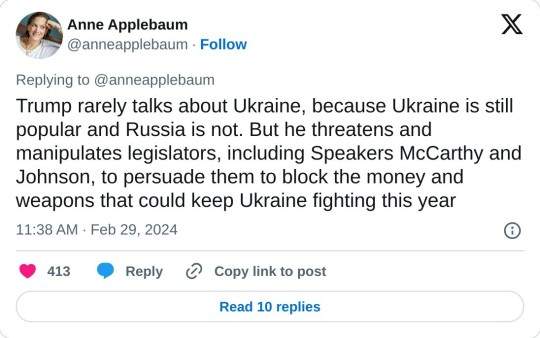
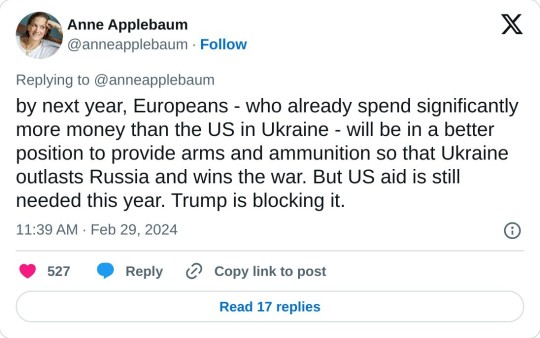
Nearly half a year has passed since the White House asked Congress for another round of American aid for Ukraine. Since that time, at least three different legislative efforts to provide weapons, ammunition, and support for the Ukrainian army have failed.
Kevin McCarthy, the former House speaker, was supposed to make sure that the money was made available. But in the course of trying, he lost his job.
The Senate negotiated a border compromise (including measures border guards said were urgently needed) that was supposed to pass alongside aid to Ukraine. But Senate Republicans who had supported that effort suddenly changed their minds and blocked the legislation.
Finally, the Senate passed another bill, including aid for Ukraine, Taiwan, Israel, and the civilians of Gaza, and sent it to the House. But in order to avoid having to vote on that legislation, the current House speaker, Mike Johnson, sent the House on vacation for two weeks. That bill still hangs in limbo. A majority is prepared to pass it, and would do so if a vote were held. Johnson is maneuvering to prevent that from happening.
Maybe the extraordinary nature of the current moment is hard to see from inside the United States, where so many other stories are competing for attention. But from the outside—from Warsaw, where I live part-time; from Munich, where I attended a major annual security conference earlier this month; from London, Berlin, and other allied capitals—nobody doubts that these circumstances are unprecedented. Donald Trump, who is not the president, is using a minority of Republicans to block aid to Ukraine, to undermine the actual president’s foreign policy, and to weaken American power and credibility.
For outsiders, this reality is mind-boggling, difficult to comprehend and impossible to understand. In the week that the border compromise failed, I happened to meet a senior European Union official visiting Washington. He asked me if congressional Republicans realized that a Russian victory in Ukraine would discredit the United States, weaken American alliances in Europe and Asia, embolden China, encourage Iran, and increase the likelihood of invasions of South Korea or Taiwan. Don’t they realize? Yes, I told him, they realize. Johnson himself said, in February 2022, that a failure to respond to the Russian invasion of Ukraine “empowers other dictators, other terrorists and tyrants around the world … If they perceive that America is weak or unable to act decisively, then it invites aggression in many different ways.” But now the speaker is so frightened by Trump that he no longer cares. Or perhaps he is so afraid of losing his seat that he can’t afford to care. My European colleague shook his head, not because he didn’t believe me, but because it was so hard for him to hear.
Since then, I’ve had a version of that conversation with many other Europeans, in Munich and elsewhere, and indeed many Americans. Intellectually, they understand that the Republican minority is blocking this money on behalf of Trump. They watched first McCarthy, then Johnson, fly to Mar-a-Lago to take instructions. They know that Senator Lindsey Graham, a prominent figure at the Munich Security Conference for decades, backed out abruptly this year after talking with Trump. They see that Donald Trump Jr. routinely attacks legislators who vote for aid to Ukraine, suggesting that they be primaried. The ex-president’s son has also said the U.S. should “cut off the money” to Ukrainians, because “it’s the only way to get them to the table.” In other words, it’s the only way to make Ukraine lose.
Many also understand that Trump is less interested in “fixing the border,” the project he forced the Senate to abandon, than he is in damaging Ukraine. He surely knows, as everybody does, that the Ukrainians are low on ammunition. He must also know that, right now, no one except the U.S. can help. Although European countries now collectively donate more money to Ukraine than we do (and the numbers are rising), they don’t yet have the industrial capacity to sustain the Ukrainian army. By the end of this year, European production will probably be sufficient to supply the Ukrainians, to help them outlast the Russians and win the war. But for the next nine months, U.S. military support is needed.
Yet Trump wants Congress to block it. Why? This is the part that nobody understands. Unlike his son, Trump himself rarely talks about Ukraine, because his position isn’t popular. Most Americans don’t want Russia to win.
Often, Trump’s motives are described as “isolationist,” but this is not quite right. The isolationists of the past were figures such as Senator Robert Taft, the son of an American president and the grandson of an American secretary of war. Taft, a loyal member of the Republican Party, opposed U.S. involvement in World War II because, as he once said, an “overambitious foreign policy” could “destroy our armies and prove a real threat to the liberty of the people of the United States.” But Trump is not concerned about our armies. He disdains our soldiers as “suckers” and “losers.” I can’t imagine that he is terribly worried about the “liberty of the people of the United States” either, given that he has already tried once to overthrow the American electoral system, and might well do it again.
Trump and the people around him are clearly not isolationists in the old-fashioned sense. An isolationist wants to disengage from the world. Trump wants to remain engaged with the world, but on different terms. Trump has said repeatedly that he wants a “deal” with Russian President Vladimir Putin, and maybe this is what he means: If Ukraine is partitioned, or if Ukraine loses the war, then Trump could twist that situation to his own advantage. Perhaps, some speculate, Trump wants to let Russia back into international oil markets and get something in return for that. But that explanation might be too complex: Maybe he just wants to damage President Joe Biden, or he thinks Putin will help him win the 2024 election. The Russian hacking of the Democratic National Committee was very beneficial to Trump in 2016; perhaps it could happen again.
Trump is already behaving like the autocrats he admires, pursuing transactional politics that will profoundly weaken the United States. But he doesn’t care. Liz Cheney, one of the few Republicans who understands the significance of this moment, describes the stakes like this: “We are at a turning point in the history not just of this nation, but of the world.” Once the U.S. is no longer the security guarantor for Europe, and once the U.S. is no longer trusted in Asia, then some nations will begin to hedge, to make their own deals with Russia and China. Others will seek their own nuclear shields. Companies in Europe and elsewhere that now spend billions on U.S. energy investments or U.S. weapons will make different kinds of contracts. The United States will lose the dominant role it has played in the democratic world since 1945.
All of this could happen even if Trump doesn’t win the election. Right now, even if he never regains the White House, he is already dictating U.S. foreign policy, shaping perceptions of America in the world. Even if the funding for Ukraine ultimately passes, the damage he has done to all of America’s relationships is real. Anton Hofreiter, a member of the German Parliament, told me in Munich that he fears Europe could someday be competing against three autocracies: “Russia, China, and the United States.” When he said that, it was my turn to shake my head, not because I didn’t believe him, but because it was so hard to hear.
39 notes
·
View notes
Text

His Saint . 2024
This is a propaganda ad in Vietnam around the year 2092 in my Cyberpunk world. Since I've told this story to only 5 people in total, below is a brief context.
The technology and power that Lương stole from the megacorps is used built his own army in the South East Asia region. V is the most important asset in it. She is his weapon and the patron saint of his holy war. For he is her God.
Inspired by the artwork by Kotteri. Timelapse will open on May 29th for Patreon members (patreon.com/nananarc). Commission Info on my website (nananarc.art)

#art#drawing#illustration#fanart#artwork#cyberpunk art#cyberpunk#cyberpunk 2077#cyberpunk 2077 v#cyberpunk oc#cp2077#cp 2077#cyberpunk 2077 fanart#cyberpunk 2077 oc#cyberpunk fanart#v cyberpunk#trần kiệt lương#original character#đặng tường vân#fem v#ship: His Saint
43 notes
·
View notes
Text
Let's take a look at Indo-Greek art and culture this week. Indo-Greek culture emerged after Alexander the Great's armies pushed to the edge of India. Even though Alexander's armies retreated, he left behind a lot of Greek culture and Greek people. The two cultures combined in all sorts of interesting ways.
Here are some coins of Agathokles the Just, a Bactrian king who ruled in the 180s BCE. We don’t know a whole lot about him, but he left behind a lot of coins that give us a sense of what must have been happening in this part of the world.
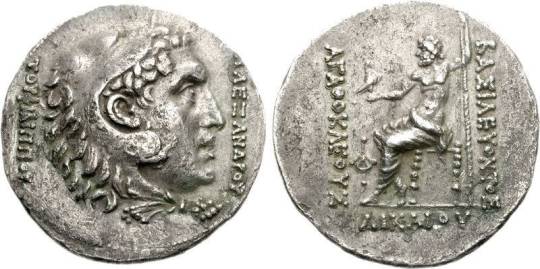
This shows Herakles wearing a lion skin on his head, with the words “ALEXANDER SON OF PHILIP;” on the back of the coin, Zeus holds an eagle, accompanied by the words “KING AGATHOKLES THE JUST.”
Pretty Greek, right?
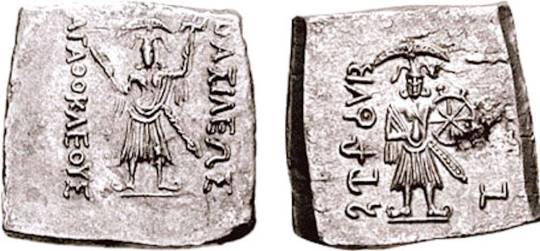
It’s square, a shape much more common in Indian coins. And you’ll notice that it has two different scripts, one on the front and one on the back. On the one side, we see the Hindu deity Balarama-Samkarshana with the words (in Greek) “KING AGATHOKLES,” while on the back we have a Hindu god, Vāsudeva-Krishna, with Agathokles’ name written in the Brahmi script, which was widely used in South Asia.
{WHF} {Ko-Fi} {Medium}
128 notes
·
View notes
Text
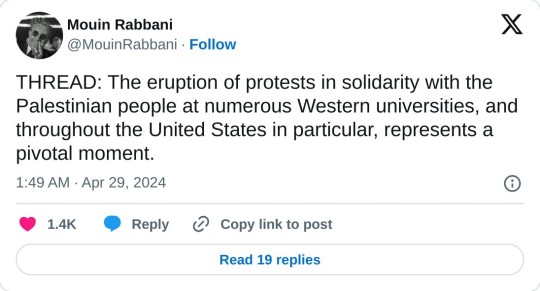
• • •
THREAD: The eruption of protests in solidarity with the Palestinian people at numerous Western universities, and throughout the United States in particular, represents a pivotal moment.
College students are, to be sure, not an accurate reflection of public opinion or faithful mirror of their societies. But their activism often serves as a bellwether, an indication of the shape of things to come.
Therein lies the enormous political significance of the encampments that are now being established at dozens of universities, from the Ivy League to state universities.
In the late 1960s and early 1970s student uprisings not only contributed to, but also portended the failure of the US imperial project in southeast Asia and its defeat in Vietnam.
Student activists also played a prominent role in confronting the worst excesses of the racial hierarchy that dominates the United States. Similarly, campaigns, at times including the occupation of administration buildings, in numerous universities during the 1980s
to demand divestment from South African and related assets, portended the end of Western backing for that country’s white-minority regime. When student activism reaches a critical mass, in other words, it is often a fairly reliable indicator of where things are heading.
In the present context the protests across university campuses are sending multiple messages. Most obviously, a rejection of Israel’s genocidal campaign against the Palestinian people in the Gaza Strip and, no less importantly,
a rejection of their own governments’ complicity and support of Israel’s transformation of the Gaza Strip into a killing field and chamber of horrors.
While that is the proximate cause, it is either underpinned by or has developed into a broader opposition to Israel as a colonial apartheid state and to its policies towards the Palestinian people more generally.
Hence the demands that universities divest from assets implicated in Israel’s oppression of the Palestinians. In other words, this is a genuine solidarity movement that sees Palestinians as human beings with inalienable rights which go beyond the right not to be massacred.
Expressed differently, the solidarity movement has served to humanize the Palestinians. To understand the profound significance of this achievement,
recall that Israel and its apologists have spent decades engaged in a systematic campaign, ably assisted by the mainstream media, to dehumanize Palestinians.
It was within living memory an article of faith that Palestinians simply do not exist. That “Palestinian” and “terrorist” became synonyms. That Palestinians are motivated by anti-Semitism and nothing else in their opposition to Israel.
Opposed to this, Israel was presented as “a light unto the nations”, “the only democracy in the Middle East” possessing “the most moral army in the world” that fought only “wars of no choice” and did so with “purity of arms”.
Until the eruption of the 1987 popular uprising, or intifada, it was a commonplace that Israel’s was a “benign” and “liberal” occupation, one that selflessly gave more than it took.
More recently, in an update of Theodor Herzl’s “rampart of Europe against Asia, an outpost of civilization as opposed to barbarism” it became “the villa in the jungle”.
Yet within the past seven months the paradigm through which Western public opinion has traditionally viewed both Israel and the Palestinians has definitively collapsed. And nowhere more definitively than on college campuses.
The transformation of course did not happen overnight, and decades of struggle and hard work by innumerable individuals within the region and beyond were required to make this moment possible.
Israel’s lurch towards ever greater levels of violence and extremism, to the extent that it is today the darling of the Third Reich’s ideological heirs, has also played its part.
The outcome is clear. Israel has lost the battle for public opinion, and it knows it. And given that for Israel public opinion is as much a strategic asset as its nuclear arsenal it is, unsurprisingly, responding hysterically.
It’s a far cry from previous eras, where Israel and its apologists could either persuade audiences of the rightness of their cause, or sufficiently confuse them into passive neutrality.
Israel and its flunkies are today deploying the same playbook and tactics against university activists that they have for decades deployed against the Palestinians: discredit, delegitimize, defame, and demonize.
Thus, any student expressing any opposition to Israel’s genocidal campaign or solidarity with its Palestinian victims is immediately denounced as “Hamas”, “terrorist”, anti-semite”, and the like.
The foot-stomping toddler who passes for assistant professor at Columbia University, to give but one example, has made it his vocation to vilify students at his own university.
Among the worst offenders, predictably, is Jonathan Greenblatt of the Defamation League, that self-proclaimed civil rights organization that used to conduct espionage in the United States on behalf of South Africa’s white-minority regime.
Once again going full Goebbels, he recently – without being challenged by his MSNBC hosts – denounced Students for Justice in Palestine and Jewish Voice for Peace as “campus proxies” for Iran.
The audacity of knowingly placing a target on Jews while drawing a generous salary on the pretext of defend their rights is hard to beat.
The problem for Israel and its apologists is that they have devalued their favorite terms of demonization to the point of making them trivial and meaningless.
Most people no longer care about being denounced as anti-Semites, terrorists, or agents of a foreign government by the likes of the Defamation League, and are no longer intimidated by the Zionist Inquisition,
because they readily understand it bears no relation to the actual definition of these terms and that these are deployed for the sole purpose of defending a foreign state and its policies.
Speaking of demonization, Vietnam’s National Liberation Front was hardly the Vienna Boys’ Choir, and at the height of the divestment movement South Africans accused of collaboration were being literally burned alive with “necklaces” consisting of petrol-soaked tires.
Yet today any student opposing Israeli genocide is absurdly required to take responsibility for Hamas and every one of its actions. It’s a sign of desperation by those who know their cause is lost.
Because they realize theirs is also a Lost Cause, Israel and its apologists are increasingly resorting to extreme measures, like deposing university presidents, threatening individual students and their employment prospects,
deploying agents provocateurs, and mobilising the police and security forces. Principle unfortunately often comes with a cost, but the manner in which the student movement has responded to these challenges has been nothing short of inspirational. END
29 notes
·
View notes
Photo
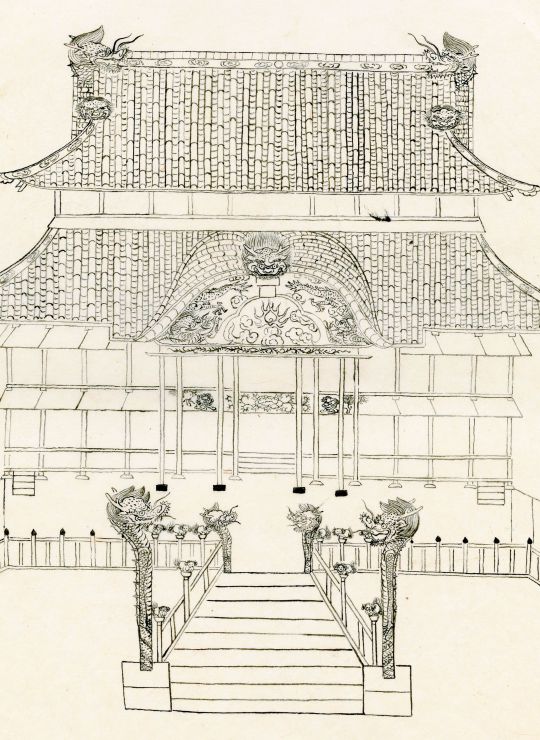
Shuri Castle - Burning castle of the Ryukyu Dynasty (Ref)
Shuri Castle, the royal castle of the Ryukyu Dynasty, was once the political, economic and cultural centre of that maritime kingdom. The date of construction of Shuri Castle is not known, but it is thought to have been built in the late 13th and 14th centuries during the Gusuku period.
Until the end of the 16th century, the Ryukyu Kingdom remained independent in turbulent East Asia, as did Korea and Vietnam, but was invaded and ruled by the Satsuma clan (now Kyusyu, Japan), and became a vassal state in the early 17th century.
After several fires and war damage, and repeated rebuilding, the World Heritage Site Shuri Castle was once again destroyed by a sudden fire on 31 October 2019, which lasted about eight hours and destroyed nine buildings and historical heritage sites, including the main hall. It is currently being rebuilt with a view to restoration in 2026.
The first burning occurred in 1453 during the struggle for the throne that followed the death of King Shō Kinpuku of the 1st Shō dynasty (Shiro-Furi Rebellion), when the castle was completely destroyed. The second fire, in 1660, took 11 years to rebuild, and the third fire in 1709 destroyed the main, north and south halls.
After the Ryukyu Disposition following the establishment of Okinawa Pref. by Japanese Government in 1879, the main hall and other buildings of Shuri Castle lost their role as the seat of government and were sold to the Japanese Army's 6th Division (Kumamoto, Japan) as a military camp and then to Shuri Ward (later Shuri City), which used them as school buildings for girls' schools.
It was almost completely destroyed during the Battle of Okinawa (WWⅡ) in 1945 and the construction of the University after the war, leaving only a small portion of the castle walls and building foundations remaining.
Full-scale reconstruction was considered in the 1980s, and the restoration work, which took about 40 years, was completed in January 2019. In October of the same year, a mysterious fire destroyed the castle again.
Shuri Castle, which has been repeatedly persecuted and burnt down but continues to revive, seems to symbolise Ryukyuan culture itself.
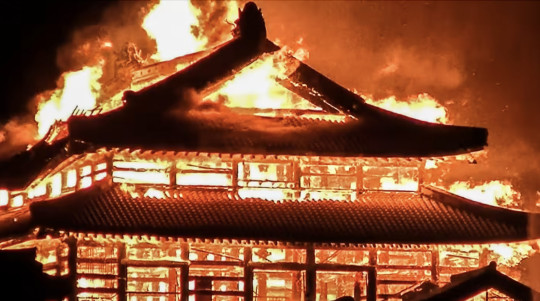
首里城 〜 燃え続ける琉球王朝のお城(参照)
琉球王朝の王城、首里城はかつてその海洋王国の政治・経済・文化の中心にあった。首里城の築城年代は明らかではないが、13世紀後半から14世紀にかけてのグスク造営期の時代に築城されたと考えられている。
琉球王国は16世紀末まで、朝鮮やベトナムと同様に激動の東アジアで独立を保っていたが、薩摩藩 (現在の九州)の侵略と支配を受け、17世紀初頭に属国となった。
世界遺産でもある首里城は、数度の火災や戦災を経て、再建を繰り返してきたが、ついに2019年10月31日、約8時間にわたる突然の火災により、本殿を含む9つの建物や歴史遺産を焼失した。現在、2026年の復興に向け、再建中である。
1度目の焼失は1453年に第一尚氏の尚金福王の死後に発生した王位争い (志魯・布里の乱) であり、城内は完全に破壊された。2度目の焼失は1660年のことであり再建に11年の年月を要した。1709年には3度目の火災が起き正殿・北殿・南殿などが焼失した。
1879年の日本政府による沖縄県設置に至る琉球処分以後は、正殿など首里城の建物は政府の所在地としての役割を喪失し、日本陸軍の第6師団 (熊本) の軍営として、その後は首里区 (後の首里市) に払い下げられ、女学校の校舎として利用された。
1945年の沖縄戦や戦後の琉球大学建設でほぼ全壊し、城壁や建物の基礎の一部が残るのみであった。1980年代に本格的な再建が検討され、約40年の歳月をかけた修復工事が2019年1月に完了した。同年10月、謎の大火災により再び焼失した。
迫害や焼失を繰り返しながらも復活を続ける首里城は、琉球文化そのものを象徴しているようだ。
103 notes
·
View notes
Text

This was Iran, circa 1973. A woman cutting her birthday cake.
This is a snapshot of Iran when it was one of the most open and progressive countries in the region, if not the world.
Just 6 years later, Iran was given (yes given, by the Western powers such as France and the U.S.) to unelected pedophile mullahs.
These mullahs have not only repressed any and all dissent, but they are murdering thousands of people all over the world, having successfully positioned Jihadi armies in over 100 countries.
Today, the Iranian Mullahs (who overtly and openly advocate murdering large swaths of others in the service of their cult), are using the Palestinians as a cudgel to attack Israel and genocide the Jews. But tomorrow, all of you reading this (except Islamists who support them, of which there are many on Tumblr), are next. Not only Jews and Christians, but any Muslim who refuses to practice Islam as it existed in the medieval 7th century.
Iran or Islamists in general, could care less about the Palestinians let alone anyone but themselves and their nightmare of a Caliphate enveloping the globe.
What you are seeing play out in Israel is merely a microcosm of what is coming to England, France, Germany, Belgium, Sweden, the U.S.,Canada, South America, Indonesia, Malaysia, and the rest of Asia, for starters.

This picture is also pre-1979 Iran, where more women attended university and sought advanced degrees than men. Notice the difference between real clothing and repressive black tents.
#secular-jew#israel#jewish#judaism#israeli#jerusalem#diaspora#secular jew#secularjew#islam#caliphate#Iran#mullahs#islamic jihad#islamism#Hezbollah#hizbollah#free iran#mullah#antisemitism#hamas#iranian#ayatollah khamenei#ayatollah#Persia#judea#tel aviv#samaria#vieformidable#gaza
24 notes
·
View notes
Text
Evelyne "Snake" Gray: Timeline
CWs: Mentioned abuse, mentioned drug use, mentioned abuse, hospital, pregnancy, miscarriage canon mw3, major character death


2002 • 5 years
First hears her brother’s scream.
2003 • 6 years
Father is arrested for public intoxication.
2004 • 7 years
Vitiligo develops on face and arms.
2005 • 8 years
Vitiligo progresses to back, abdomen, and legs.
2006 • 9 years
Sent to hospital for extensive wounds to back and arms.
2007 • 10 years
Finds out Alice is pregnant
August - Nellian and Claire are born.
2008 • 11 years
Nellian and Claire’s first birthday.
2009 • 12 years
Moves to London.
2010 • 13 years
Alice (mother) begins abusing prescription drugs.
2011 • 14 years
Begins working at a grocery store after school.
2012 • 15 years
December - Meets John “Soap” Mactavish while he is visiting his aunt.
2013 • 16 years
Sexual abuse begins.
Attempts to leave London.
2014 • 17 years
Andrew (brother) flees the United Kingdom.
Enlists for the British Army.
Cadet Gray
2015 • 18 years
Graduates secondary school.
Forges death certificate for Andrew.
Mother and father are arrested for child abuse due to anonymous tip.
Gains full guardian custody of Nellian and Claire.
Moves to an apartment in Manchester.
2016 • 19 years
Private Gray
Sent on first anti-drug operation.
Meets Kyle “Gaz” Garrick at a cafe while on leave.
2017 • 20 years
Corporal Gray
Starts dating Kyle James Garrick.
Meets Commander Phillip Graves while teamed with Shadow Company.
Charged with Aggravated Assault Against a Commanding Officer.
Meets General Herschel Shepherd, Kate Laswell.
Transferred to CIA Special Operations Team.
Given call sign “Snake.”
2018 • 21 years
Says “I Love You,” to Kyle after bad mission.
Adopts three kittens, Squid, Noodles, and Yoshi.
2019 • 22 years
Meets Captain John William Price.
Teams up with Captain Price and Stg. Garrick while in Urzikstan. Evelyne is gravely injured.
October - Miscarries unknowingly
November - Marries Kyle in Norway.
2020 • 23 years
January-March - Medical Leave
Meets Simon "Ghost" Riley
Assists in humanitarian relief in South Asia.
Becomes Intel and Negotiation Specialist.
December - Positive pregnancy test
Goes on medical leave immediately.
2021 • 24 years
Nellian and Claire go to secondary school.
Finds out the gender. A girl.
Starts calling the baby “Peach” due to the fruit being her pregnancy craving.
July 8th - Gives birth to Scarlette Ada Garrick 2 weeks early. Kyle is deployed during the birth.
2022 • 25 years
Kyle and Evelyne buy their first house in Scotland.
Scarlette’s First Birthday.
Emergency deployment to assist Laswell while stopping Hassan.
Graves’ Betrayal of 141.
2023 • 26 years
Goes back to fully active duty.
Meets Victoria “Whiskey” Callahan
Nellian and Claire graduate secondary school.
Scarletts turns 2.
Deployed to assist in stopping Makarov.
Gathers intel on Makarov’s location.
John “Soap” Mactavish is KIA. Evelyne pays her respects days after his funeral, out of respect for Meabh.
2024 • 27 years
January - Positive pregnancy test.
Goes on inactive duty.
Finds out the gender. A girl.
May 31st: Gives birth to Leona Clove Garrick
Meets Meabh O’Malley

#call of duty#cod#cod modern warfare#cod mw2#modern warfare#call of duty modern warfare#call of duty oc#cod oc#ghost cod#kyle gaz garrick#johnny soap mactavish#john soap mactavish#kyle garrick#kyle gaz garrick x evelyne snake gray#evelyne 'snake' gray#timeline#oc timeline#john price#simon ghost riley#original character#captain price#john bravo six price#shadow company#simon riley#ghost simon riley#ghost mw2#ghost call of duty#cod ghost#Kyle gaz garrick#task force 141
13 notes
·
View notes
Text
Down by the River — Nanami Kento x Tiana (Disney)
Summary: In the early 1930s, Nanami embarks on a business trip to the South, where the Crescent City awaits. His journey begins with new connections and the enticing allure of Southern cuisine. America might not be so bad after all.
Tags: Crack Relationships, Crack Crossover, Crack Treated Seriously, Why Did I Write This?, Fluff, Business Trip, Alternate Universe - 1930s, Drinking & Talking, Comfort No Hurt
a/n: The fan edits got me. My Elsa x Jack Frost shipper is jumping out for this. I have to say... this is easily the most random thing I've ever written, but it helped break my writer's block, so woohoo! Write weird shit more often, y'all. Also posted on AO3.

America was Nanami’s least favorite place to travel.
Work had taken him all over. He’d seen all of Japan, every nook and cranny—old and new. He’d been to China more times than he could count; his Cantonese was better now than before, and he could make his way around without an attendant. Asia was his domain; he’d grown used to recognizing the surnames and affiliations that mattered, what gestures were niceties in one place, and a way to get mowed down in a fit of rage in another.
America was a different beast altogether. It was a wild and enigmatic land that kept Nanami perpetually on edge and consistently uneasy in his own skin. The places were chaotic—New York and San Francisco. Wall Street and Pacific Heights, most often. Two opposing coasts, filled to the brim with people capitalizing most on those with the least.
White-collar crime and cocaine—that was what Nanami knew of the States. It made him wish he hadn’t learned English; he wouldn’t have to live with as much as he knew if he hadn’t.
Despite not liking it, he’d grown used to it though—the coasts and the insanity that happened on each of them.
The South, in contrast, was wholly unfamiliar territory. He’d never been and wasn’t quite sure what to expect as the steamboat continued down the river, churning water and whistling every few minutes as it continued down the path. He'd heard of the common things: the chambermaids and the sharecropping, the stark divide.
Asia had its things, too, though, so he tried not to judge. He was headed to New Orleans for one simple thing: to meet with the sugar baron and solidify a trade deal. His sugar for their textiles.
Simple, tedious. Safer than sorcery.
The ride into the city was surprisingly comfortable. He lounged in a reclined chair on the deck, his eyes hidden behind shades that concealed his exhaustion from the arduous journey across borders—across seas. The sky painted itself in alluring hues of lavender and rose, casting a serene glow over the waters of the Mississippi, like spilled oil paint.
The air hung heavy with the scent of magnolia blossoms, their perfume an intoxicating blend of sweetness and decay. Spanish moss, soft as bundles of silk, swayed languidly from the cypress trees that lined the riverbank, caressed by the gentle breeze.
The Crescent City, that’s what his boss had called it. The birthplace of jazz.
Nanami couldn’t say he wasn’t intrigued by the prospect of it.
"Please collect your belongings, everyone," a petite deckhand announced, dressed in long corduroy trousers and a cute puffed hat. "We'll be docking in port in five minutes."
Nanami adjusted his glasses, straightening out the legs of his slacks as he made his way to the port side of the boat and watched the city come into view along with the sound. The bustling swing of music was expected, but Nanami hadn't anticipated enjoying it so much. The masterful wail of saxophones, the sultry croon of trumpets, and the deep, resonant throb of bass greeted him as he filed off the boat.
Other men exited the boat before him. Some wore business suits, while others wore Navy uniforms, and a few were in Army attire. Most bobbed their heads along to the music, while some outright danced. People lined the port, leaning on the ropes to catch a glimpse of the arrivals they'd come down to the harbor to greet and welcome home.
The city had a vibe reminiscent of New York, perhaps, but it felt more homey. It felt good in his soul.
"Hello, gentlemen. Good to see you all safe and sound!"
Among the welcoming crowd, a young woman stepped forward with a beaming smile, scanning the group until she spotted Nanami, skipping over to him. Her big blue eyes shone as she looked up at him, tilting her body to get a good look at his face. “You must be Kento, right?” Nanami nodded. She must be the daughter. "Wonderful! My name's Charlotte," she introduced herself, coupled with a sweet giggle. "You can call me Lottie, though. Everybody does."
Nanami tipped his head in a subdued bow, a gesture that the American women found charming.
“Pleased to meet you, Lottie.”
She smiled like a young girl, all cherry pink cheeks and tight lips. It was cute, demure in a way that spelled immaturity rather than modesty.
Not Nanami’s type.
“My daddy told me to come ‘round here to collect you. Is this all you brought with you?” She pointed to his briefcase and the small musette bag on his shoulder. He nodded again. “That’s light. Are you hungry? Have you eaten? That Trans-Pacific is a long way’s journey to get here. I bet you’re starving.”
Nanami hummed, acknowledging her observation. "I could eat. It's been a long day."
"A long few months, I reckon." Lottie placed a comforting hand on his back, gently steering him further into the bustling city. "My good friend works at this little ol’ restaurant down on Lafayette Street. It's just a hop, skip this way, and we can get you some good eatin'. Have you had Cajun before?"
Lottie's words tumbled out rapidly, but Nanami managed to keep up. He shook his head, allowing her to guide him through the lively streets.
"Oh, you're in for a treat then. This here is the best food you'll ever have. Just wait until you try a beignet." She playfully wiggled her brows, her enthusiasm infectious.
Though Nanami didn't understand the term "beignet," he took her excitement as a promising sign. "Whatever tastes good, I'll try."
"That's the spirit!" Lottie gave his suit jacket a friendly pat as they weaved through the crowd, exchanging greetings with any familiar faces she spotted.
“Here we are, mister. Hope you brought a loose pair of britches 'cause you’ll need ‘em.”
Nanami looked up at the building, taking off his shades to read the chalk writing fixed onto the side.
Duke’s. Charming.
The ambiance inside was a perfect mirror of the outdoors. People packed in from wall to wall, and the music from just outside the rear of the restaurant wafted inside, adding to the vibrant atmosphere.
“Let’s go sit you down at the bar, get a nice cold one and some grub in that belly. Tiana!”
He sat, slipping off his jacket to drape it across his seat, while his glasses found a home on the bartop. His bag hit the floor with a thud as he dropped it to rest between his feet.
“Hey, Lottie,” a sweet voice floated from the kitchen, followed by the source of it. The woman—slim-figured with rich brown skin—gave Nanami pause. She was beautiful, not unlike many of the women he’d met with her complexion over the years, but she was more, in a way.
Perhaps it was the curls. Nanami had developed a liking for women with thick, coily curls. They framed her face exquisitely.
“Hey, Tia. This is Kento.” Lottie placed a hand on Nanami’s chest as she introduced him. "He's a business friend of Daddy's. Take good care of him for me, will you? I have some business to attend to myself while Daddy’s out at the shooting range."
Lottie winked, and Tiana—Tia, as she called her—responded with a gentle smile.
“Can do,” she assured Lottie before turning her gaze to Nanami. “Give me one second, sugar, and I’ll be right with you.”
Nanami nodded, settling into his seat. A group of soldiers occupied the other end of the bar, rowdy as they sang unfamiliar songs. There was a little curse lazing on the bartop, slumbering against one of the soldier’s arms—surprisingly harmless.
He left it alone.
“Have a nice meal, Mr. Kento. I’ll be ’round to come get you a little later tonight,” Lottie purred with a natural pout, her lips reminiscent of a porcelain doll's. “Don’t have too much fun without me, y’all.”
“Wouldn’t dream of it,” Tiana replied with a warm smile, disappearing into the kitchen to retrieve a full round of plates.
She moved through the bustling restaurant with a graceful rhythm, her deft hands skillfully balancing trays filled with tantalizing cuisine—Creole, Nanami assumed from the building sign. He couldn’t quite understand the difference between that and Cajun, but all the food that passed his nose smelled heavenly all the same.
The spice that clung to the food was present in the air, pleasantly familiar, like the hawker centers in Singapore or the night markets in Taiwan. He still harbored dreams of visiting Malaysia, indulging in street food, experiencing Mamak stalls, exploring mosques, and paying his respects to the land.
His boss informed him he was slated to go to Germany next, for what he didn’t yet know. He could dream about Malaysia in the meantime.
He took out his pocket notebook to jot the thought down.
“Order up!”
Nanami followed Tiana's graceful movements with his eyes, catching glimpses of each dish she served, the way she bantered with the other patrons and had every man in the place hanging off of each word. Her presence was striking and commanding—a woman in charge.
That’s what it was—what made her so beautiful. She was a woman. The kind Nanami did like.
The meticulous care she took in plating the food made it as visually inviting as the enticing aroma was to his senses. Her apron bore the telltale signs of ware of a kitchen in perpetual motion, a fragrant cloud carrying the essence of spices and sweetness floating around her.
As she passed by him their eyes met, and a knowing smile graced her lips.
“So, you’re from out of town, huh?” she said, tawny brown eyes looking up at him through wispy lashes. She cleaned a mug, stuck in a constant stream of motion that made it hard for Nanami to look away.
Nanami nodded, and she placed the cup under the beer dispenser, pouring him a tall glass.
“Thank you,” he acknowledged, accepting the beer when she set it in front of him, accompanied by a shaker of flavored salt.
“How far out of town?”
Nanami hummed thoughtfully, trailing his fingers through the condensation dampening the sides of his mug.
“Asia. Here on business.”
“You’re from Asia?” Tiana's eyes sparkled with intrigue as though she were solving a puzzle. “Which part? Can I guess?”
Nanami jerked one shoulder. “Go ahead.”
“Maybe the Philippines?” she ventured, passing around more beers. “Lots of business types love the Philippines. The soldiers never shut up about it.”
Nanami quirked a brow, aware of why soldiers held such fondness for the Philippines. “No,” he replied, hiding a smile behind his cup. “Try again.”
“China?”
“Nope,” Nanami stated before taking another sip. “Been there a lot, mainly Hong Kong. I’m not from there, though.”
“Japan?” she guessed, her eyes squinting, her brow raised.
Nanami thumped his finger against the glass with a soft clink, clink, clink. “Japan.”
Her triumphant smile was indeed beautiful, with pretty teeth providing a striking contrast against the fullness of her lips and the warm tone of her skin.
“Got a wife hidden over there or something?” she teased, a sweet smirk gracing her lips. “How many kids?”
“No kids, no wife,” Nanami responded softly, feeling the tension in his body from the long journey. “My maternal grandfather was half Dutch, half something else. My grandmother was Japanese, and my mom married a European man in Japan. They stayed there my whole life, so… Japanese.”
“Fascinatin’. What business brings you here? If you can tell me. First time?”
“I can,” Nanami said, taking a few more gulps. The beer tasted different than what he’d had before in the States, less malty and a hint sweeter. “It’s my first time in Louisiana, but not America in general. I’m here meeting another businessman—sugar cane.”
“Ah, that explains Charlotte. I thought she’d just taken a liking to you; she’s always good at finding the handsome ones.”
Nanami perked up at that, a hint of a smile gracing his lips, fueled by the warmth of the beer. Tiana, with practiced ease, poured him another glass.
“I’m handsome, then?”
Tiana rolled her eyes. “You know you are, with your dapper suit and those eyes. Women must throw themselves at you.”
Nanami tilted his head, a little maybe present in the motion. He didn’t indulge nearly as often as he could.
“Have you met Big Daddy yet?” Tiana questioned, and Nanami almost spit out his beer.
He knew enough of what American women liked to call men that they fancied. He’d never heard the term out in the wild, though.
“Oh, excuse me. Eli La Bouff,” Tiana clarified with a teasing laugh, her lips even prettier when she smiled. “Lottie’s father. She calls him Big Daddy, usually. You’ll see why when you do meet him.”
Nanami nodded, a soft chuckle passing through his teeth. People in the South were different, then. Lighter, more hospitable.
Tiana leaned in closer to the bar, narrowing the space between them as she addressed Nanami. “You look hungry. What can I get started for you, sugar?”
Nanami met her gaze, a hint of a smile playing on his lips. "Surprise me," he replied, his voice low and smooth. “I prefer savory, but I’m craving something a little sweet.”
Tiana hummed, tapping her chin. “How about blackened salmon with a sweet bourbon glaze, red beans and rice, and piping hot Andouille sausage and chicken gumbo to get you started? We’ll pair it with zucchini, corn maque choux, slow-cooked collard greens, mac and cheese, with some fresh beignets to top you off for dessert,” she said, leaning over to glance at Nanami's stomach, subtly assessing the fit of his dress shirt against his well-defined physique, “if you have any room, that is. How’s that sound?”
“That sounds divine,” Nanami said, solely because of the silky tone Tiana said every word with, not because he knew what any of the dishes were. “You make everything sound good.”
“I made the recipes, so it will be.” She smiled; Nanami returned it. “Wait here, get comfy. You have a long journey ahead of you.”
Nanami leaned back slightly in his seat, his eyes following as she went to put his order in with the kitchen. It was then that he noticed a little curse on her back, small—the size of a quarter. It was the curse of abundance. Blessed for riches through hardship.
A lucky curse, Geto would have called it.
Nanami left it alone, too, sipping his beer as he waited for his food.
He couldn't help but smirk to himself; Tiana’s words took root in his mind. So did she, it seemed.

Do not perceive me for this 🙈 Come say hi on Twitter!
45 notes
·
View notes
Text
SHANGHAI — Over the past generation, China’s most important relationships were with the more developed world, the one that used to be called the “first world.” Mao Zedong proclaimed China to be the leader of a “third” (non-aligned) world back in the 1970s, and the term later came to be a byword for deprivation. The notion of China as a developing country continues to this day, even as it has become a superpower; as the tech analyst Dan Wang has joked, China will always remain developing — once you’re developed, you’re done.
Fueled by exports to the first world, China became something different — something not of any of the three worlds. We’re still trying to figure out what that new China is and how it now relates to the world of deprivation — what is now called the Global South, where the majority of human beings alive today reside. But amid that uncertainty, Chinese exports to the Global South now exceed those to the Global North considerably — and they’re growing.
The International Monetary Fund expects Asian countries to account for 70% of growth globally this year. China must “shape a new international system that is conducive to hedging against the negative impacts of the West’s decoupling,” the scholar and former People’s Liberation Army theorist Cheng Yawen wrote recently. That plan starts with Southeast Asia and extends throughout the Global South, a terrain that many Chinese intellectuals see as being on their side in the widening divide between the West and the rest.
“The idea is that what China is today, fast-growing countries from Bangladesh to Brazil could be tomorrow.”
China isn’t exporting plastic trinkets to these places but rather the infrastructure for telecommunications, transportation and digitally driven “smart cities.” In other words, China is selling the developmental model that raised its people out of obscurity and poverty to developed global superpower status in a few short decades to countries with people who have decided that they want that too.
The world China is reorienting itself to is a world that, in many respects, looks like China did a generation ago. On offer are the basics of development — education, health care, clean drinking water, housing. But also more than that — technology, communication and transportation.
Back in April, on the eve of a trip to China, Brazilian President Luiz Inacio Lula da Silva sat down for an interview with Reuters. “I am going to invite Xi Jinping to come to Brazil,” he said, “to get to know Brazil, to show him the projects that we have of interest for Chinese investment. … What we want is for the Chinese to make investments to generate new jobs and generate new productive assets in Brazil.” After Lula and Xi had met, the Brazilian finance minister proclaimed that “President Lula wants a policy of reindustrialization. This visit starts a new challenge for Brazil: bringing direct investments from China.” Three months later, the battery and electric vehicle giant BYD announced a $624 million investment to build a factory in Brazil, its first outside Asia.
Across the Global South, fast-growing countries from Bangladesh to Brazil can send raw materials to China and get technological devices in exchange. The idea is that what China is today, they could be tomorrow.
At The Kunming Institute of Botany
In April, I went to Kunming to visit one of China’s most important environmental conservation outfits — the Kunming Institute of Botany. Like the British Museum’s antiquities collected from everywhere that the empire once extended, the seed bank here (China’s largest) aspires to acquire thousands of samples of various plant species and become a regional hub for future biotech research.
From the Kunming train station, you can travel by Chinese high-speed rail to Vientiane; if all goes according to plan, the line will soon be extended to Bangkok. At Yunnan University across town, the economics department researches “frontier economics” with an eye to Southeast Asian neighboring states, while the international relations department focuses on trade pacts within the region and a community of anthropologists tries to figure out what it all means.
Kunming is a bland, air-conditioned provincial capital in a province of startling ethnic and geographic diversity. In this respect, it is a template for Chinese development around Southeast Asia. Perhaps in the future, Dhaka, Naypyidaw and Phnom Penh will provide the reassuring boredom of a Kunming afternoon.
Imagine you work at the consulate of Bangladesh in Kunming. Why are you in Kunming? What does Kunming have that you want?
The Bengali poet Rabindranath Tagore lyrically described Asia’s communities as organic and spiritual in contrast with the materialism of the West. As Tagore spoke of the liberatory powers of art, his Chinese listeners scoffed. The Chinese poet Wen Yiduo, who moved to Kunming during World War II and is commemorated with a statue at Yunnan Normal University in Kunming, wrote that Tagore’s work had no form: “The greatest fault in Tagore’s art is that he has no grasp of reality. Literature is an expression of life and even metaphysical poetry cannot be an exception. Everyday life is the basic stuff of literature, and the experiences of life are universal things.”
“Xi Jinping famously said that China doesn’t export revolution. But what else do you call train lines, 5G connectivity and scientific research centers appearing in places that previously had none of these things?”
If Tagore’s Bengali modernism championed a spiritual lens for life rather than the materiality of Western colonialists, Chinese modernists decided that only by being more materialist than Westerners could they regain sovereignty. Mao had said rural deprivation was “一穷二白” — poor and empty; Wen accused Tagore’s poetry of being formless. Hegel sneered that Asia had no history, since the same phenomena simply repeated themselves again and again — the cycle of planting and harvest in agricultural societies.
For modernists, such societies were devoid of historical meaning in addition to being poor and readily exploited. The amorphous realm of the spirit was for losers, the Chinese May 4th generation decided. Railroads, shipyards and electrification offered salvation.
Today, as Chinese roads, telecoms and entrepreneurs transform Bangladesh and its peers in the developing world, you could say that the argument has been won by the Chinese. Chinese infrastructure creates a new sort of blank generic urban template, one seen first in Shenzhen, then in Kunming and lately in Vientiane, Dhaka or Indonesian mining towns.
The sleepy backwaters of Southeast Asia have seen previous waves of Chinese pollinators. Low Lan Pak, a tin miner from Guangdong, established a revolutionary state in Indonesia in the 18th century. Li Mi, a Kuomintang general, set up an independent republic in what is now northern Myanmar after World War II.
New sorts of communities might walk on the new roads and make calls on the new telecom networks and find work in the new factories that have been built with Chinese technology and funded by Chinese money across Southeast Asia. One Bangladeshi investor told me that his government prefers direct investment to aid — aid organizations are incentivized to portray Bangladesh as eternally poor, while Huawei and Chinese investors play up the country’s development prospects and bright future. In the latter, Bangladeshis tend to agree.
“Is China a place, or is it a recipe for social structure that can be implemented generically anywhere?”
The majority of human beings alive today live in a world of not enough: not enough food; not enough security; not enough housing, education, health care; not enough rights for women; not enough potable water. They are desperate to get out of there, as China has. They might or might not like Chinese government policies or the transactional attitudes of Chinese entrepreneurs, but such concerns are usually of little importance to countries struggling to bootstrap their way out of poverty.
The first world tends to see the third as a rebuke and a threat. Most Southeast Asian countries have historically borne abuse in relationship to these American fears. Most American companies don’t tend to see Pakistan or Bangladesh or Sumatra as places they’d like invest money in. But opportunity beckons for Chinese companies seeking markets outside their nation’s borders and finding countries with rapidly growing populations and GDPs. Imagine a Huawei engineer in a rural Bangladeshi village, eating a bad lunch with the mayor, surrounded by rice paddies — he might remember the Hunan of his childhood.
Xi Jinping famously said that China doesn’t export revolution. But what else do you call train lines, 5G connectivity and scientific research centers appearing in places that previously had none of these things?
Across the vastness of a world that most first-worlders would not wish to visit, Chinese entrepreneurs are setting up electric vehicle and battery companies, installing broadband and building trains. The world that is looming into view on Huawei’s 2022 business report is one in which Asia is the center of the global economy and China sits at its core, the hub from which sophisticated and carbon-neutral technologies are distributed. Down the spokes the other way come soybeans, jute and nickel. Lenin’s term for this kind of political economy was imperialism.
If the Chinese economy is the set of processes that created and create China, then its exports today are China — technologies, knowledge, communication networks, forms of organization. But is China a place, or is it a recipe for social structure that can be implemented generically anywhere?
Huawei Station
Huawei’s connections to the Chinese Communist Party remain unclear, but there is certainly a case of elective affinities. Huawei’s descriptions of selfless, nameless engineers working to bring telecoms to the countryside of Bangladesh is reminiscent of Party propaganda and “socialist realist” art. As a young man, Ren Zhengfei, Huawei’s CEO, spent time in the Chongqing of Mao’s “third front,” where resources were redistributed to develop new urban centers; the logic of starting in rural areas and working your way to the center, using infrastructure to rappel your way up, is embedded within the Maoist ideas that he studied at the time. Today, it underpins Huawei’s business development throughout the Global South.
I stopped by the Huawei Analyst Summit in April to see if I could connect the company’s history to today. The Bildungsroman of Huawei’s corporate development includes battles against entrenched state-owned monopolies in the more developed parts of the country. The story goes that Huawei couldn’t make inroads in established markets against state-owned competitors, so got started in benighted rural areas where the original leaders had to brainstorm what to do if rats ate the cables or rainstorms swept power stations away; this story is mobilized today to explain their work overseas.
Perhaps at one point, Huawei could have been just another boring corporation selling plastic objects to consumers across the developed world, but that time ended definitively with Western sanctions in 2019, effectively banning the company from doing business in the U.S. The sanctions didn’t kill Huawei, obviously, and they may have made it stronger. They certainly made it weirder, more militant and more focused on the markets largely scorned by the Ericssons and Nokias of the world. Huawei retrenched to its core strength: providing rural and remote areas with access to connectivity across difficult terrain with the intention that these networks will fuel telehealth and digital education and rapidly scale the heights of development.
Huawei used to do this with dial-up modems in China, but now it is building 5G networks across the Global South. The Chinese government is supportive of these efforts; Huawei’s HQ has a subway station named for the company, and in 2022 the government offered the company massive subsidies.
“For many countries in the Global South, the model of development exemplified by Shenzhen seems plausible and attainable.”
For years, the notion of an ideological struggle between the U.S. and China was dismissed; China is capitalist, they said. Just look at the Louis Vuitton bags. This misses a central truth of the economy of the 21st century. The means of production now are internet servers, which are used for digital communication, for data farms and blockchain, for AI and telehealth. Capitalists control the means of production in the United States, but the state controls the means of production in China. In the U.S. and countries that implicitly accept its tech dominance, private businesspeople dictate the rules of the internet, often to the displeasure of elected politicians who accuse them of rigging elections, fueling inequality or colluding with communists. The difference with China, in which the state has maintained clear regulatory control over the internet since the early days, couldn’t be clearer.
The capitalist system pursues frontier technologies and profits, but companies like Huawei pursue scalability to the forgotten people of the world. For better or worse, it’s San Francisco or Shenzhen. For many countries in the Global South, the model of development exemplified by Shenzhen seems more plausible and attainable. Nobody thinks they can replicate Silicon Valley, but many seem to think they can replicate Chinese infrastructure-driven middle-class consumerism.
As Deng Xiaoping said, it doesn’t matter if it is a black cat or a white cat, just get a cat that catches mice. Today, leaders of Global South countries complain about the ideological components of American aid; they just want a cat that can catch their mice. Chinese investment is blank — no ideological strings attached. But this begs the question: If China builds the future of Bangladesh, Indonesia, Pakistan and Laos, then is their future Chinese?
Telecommunications and 5G is at the heart of this because connectivity can enable rapid upgrades in health and education via digital technology such as telehealth, whereby people in remote villages are able to consult with doctors and hospitals in more developed regions. For example, Huawei has retrofitted Thailand’s biggest and oldest hospital with 5G to communicate with villages in Thailand’s poor interior — the sort of places a new Chinese high-speed train line could potentially provide links with the outside world — offering Thai villagers without the ability to travel into town the opportunity to get medical treatments and consultations remotely.
The IMF has proposed that Asia’s developing belt “should prioritize reforms that boost innovation and digitalization while accelerating the green energy transition,” but there is little detail about who exactly ought to be doing all of that building and connecting. In many cases and places, it’s Chinese infrastructure and companies like Huawei that are enabling Thai villagers to live as they do in Guizhou.
Chinese Style Modernization?
The People’s Republic of China is “infinitely stronger than the Soviet Union ever was,” the U.S. ambassador to China, Nicholas Burns, told Politico in April. This prowess “is based on the extraordinary strength of the Chinese economy — its science and technology research base, its innovative capacity and its ambitions in the Indo-Pacific to be the dominant power in the future.” This increasingly feels more like the official position of the U.S. government than a random comment.
Ten years ago, Xi Jinping proposed the notion of a “maritime Silk Road” to the Indonesian Parliament. Today, Indonesia is building an entirely new capital — Nusantara — for which China is providing “smart city” technologies. Indonesia has a complex history with ethnic Chinese merchants, who played an intermediary role between Indigenous people and Western colonists in the 19th century and have been seen as CCP proxies for the past half century or so. But the country is nevertheless moving decisively towards China’s pole, adopting Chinese developmental rhythms and using Chinese technology and infrastructure to unlock the door to the future. “The internet, roads, ports, logistics — most of these were built by Chinese companies,” observed a local scholar.
The months since the 20th Communist Party Congress have seen the introduction of what Chinese diplomats call “Chinese-style modernization,” a clunky slogan that can evoke the worst and most boring agitprop of the Soviet era. But the concept just means exporting Chinese bones to other social bodies around the world.
If every apartment decorated with IKEA furniture looks the same, prepare for every city in booming Asia to start looking like Shenzhen. If you like clean streets, bullet trains, public safety and fast Wi-Fi, this may not be a bad thing.
Chinese trade with Southeast Asia is roughly double that between China and the U.S., and Chinese technology infrastructure is spreading out from places like the “Huawei University” at Indonesia’s Bandung Institute of Technology, which plans to train 100,000 telecom engineers in the next five years. We’re about to see a generation of “barefoot doctors” throughout Southeast Asia traveling by moped across landscapes of underdevelopment connected to hubs of medical data built by Chinese companies with Chinese technology.
In 1955, the year of the Bandung Conference in Indonesia, the non-aligned world was almost entirely poor, cut off from the means of production in a world where nearly 50% of GDP globally was in the U.S. Today, the logic of that landmark conference is alive today in Chinese informal networks across the Global South, with the key difference that China can now offer these countries the possibility of building their own future without talking to anyone from the Global North.
Welcome to the Sinosphere, where the tides of Chinese development lap over its borders into the remote forests of tropical Asia, and beyond.
60 notes
·
View notes
Text
"Ribu's anti-imperialist feminist discourse would later manifest in its solidarity protests against kisaeng tourism. This sex tourism involved Japanese businessmen traveling to South Korea to partake in the sexual services of young South Korean women who worked at clubs called kisaengs. Ribu's protests against kisaeng tourism represented how the liberation of sex combined with ribu's anti-imperialism and enabled new kinds of transnational feminist solidarity based on a concept of women's sexual exploitation and sexual oppression. From ribu's perspective, this form of tourism represented the reformation of Japanese economic imperialism in Asia. They were not against sex work by Japanese women, but opposed to the continued sexual exploitation of Korean women as a resurgence of the gendered violence of imperialism: Ribu activists hence connected imperialism and sexual oppression of colonized women to the continuing sexual exploitation of Korean women in the 1970s. In this way, they were able to expand the leftist critique of imperialism and, at the same time, point to the fault lines and inadequacies of the left.
In her critique of the left, Tanaka points to its failure to have a theory of the sexes.
Even in movements that are aiming towards human liberation, by not having a theory of struggle that includes the relation between the sexes. the struggle becomes thoroughly masculinist and male-centered (dansei-chushin shugi].
According to ribu activists, this male-centered condition infected not only the theory of the revolution and delimited its horizon, but it created a gendered concept of revolution that privileged masculinist hierarchies within the culture of the left. Ribu activists decried the hypocrisy of the left and what it deemed to be the all-too-frequent egotistical posturing of the "radical men" who "eloquently talked about solidarity, the inter national proletariat and unified will," but did not really consider women part of human liberation. Ribu activists rebelled against Marxist dogma and rejected these gendered hierarchies that valued knowledge of the proper revolutionary theory over lived experience and relationships. Moreover, ribu activists criticized what they experienced as masculinist forms of militancy that privileged participation in street battles with the riot police as the ultimate sign of an authentic revolutionary. While being trained to use weapons, activists like Mori Setsuko questioned whether engaging in such bodily violence was the way to make revolution. Ribu's rejection and criticism of a hierarchy that privileged violent confrontation forewarned of the impending self-destruction within the New Left.
...
News of URA [United Red Army] lynchings, released in 1972, devastated the reputation of the New Left in Japan, and many across the left condemned these actions. This case of internalized violence within the left marked its demise. Although ribu activists were likewise horrified by such violence expressed against comrades, many ribu activists responded in a profoundly radical manner that I have theorized elsewhere as "critical solidarity." Ribu activists had already refused to lionize the tactics of violence; hence, they in no way supported the violent internal actions of the URA. However, rather than simply condemning the URA leaders and comrades as monsters and nonhumans [hi-ningen), they sought to comprehend the root of the problem. They recognized that every person possesses a capacity for violence, but that society prohibits women from expressing their violent potential. In response to the state's gendered criminalization of Nagata as an insurgent and violent woman, ribu activists practiced what I describe as feminist critical solidarity specifically for the women of the URA. Ribu activists went in support to the court hearings and wrote about their experience and critical observations of how URA members were being treated. By visiting the URA women at the detention centers, consequently, ribu activists came under police surveillance. Ribu activists enacted solidarity in ways that were tot politically pragmatic but instead philosophically motivated. Their response involved a capacity for radical self-recognition in the loathsome actions of the other. Activists wrote extensively about Nagata - for example, Tanaka described Nagata in her book Inochi no onna-tachi e [To Women with Spirit] as a kind of "ordinary" woman whom she could have admired, except for the tragedy of the lynching incidents. In 1973, Tanaka wrote a pamphlet titled "Your Short Cut Suits You, Nagata!" in response to the state's gendered criminalization of the URA's female leader, the deliberate publication of such humanizing discourse evinces ribu's efforts to express solidarity with the women who were arguably the most vilified females of their time. Hence, ribu engaged in actions that supported these criminalized others even when the URA'S misguided pursuit of revolution resulted in the unnecessary deaths of their own comrades. Through ribu's critical solidarity with the URA, they modeled the imperative of imperfect radical alliances, opening up a philosophically motivated relationality with abject subjects and a new horizon of counter-hegemonic alliances against the dominant logic of heteropatriarchal capitalist imperialism.
While the harsh criticism of the left was warranted and urgently needed given the deep sedimentation of pervasive forms of sexist practice, it should be noted that, at the outset of the movement, there were various ways in which ribu's intimate relationship with other leftist formations characterized its emergence. At ribu's first public protest, which was part of the October 21 anti-war day, some women carried bamboo poles and wooden staves as they marched in the street, jostling with the police." Ribu did not advocate pacifism; its newspapers regularly printed articles on topics such as "How to Punch a Man." During ribu protests from 1970-2, some ribu activists-as noted, with Yonezu and Mori - still wore helmets that were markers of one's political sect and a common student movement practice."
- Setsu Shigematsu, “'68 and the Japanese Women’s Liberation Movement,” in Gavin Walker, ed., The Red Years: Theory, Politics and Aesthetics in the Japanese ‘68. London and New York: Verso, 2020. p. 89-90, 91-92
#setsu shigematsu#ribu#revolutionary feminism#feminist history#patriarchal violence#heteropatriarchy#social justice#history of social justice#militant action#far left#new left#1968#japanese 68#japanese history#left history#academic quote#reading 2023#critical solidarity#united red army#anti-imperialism#sex tourism
7 notes
·
View notes